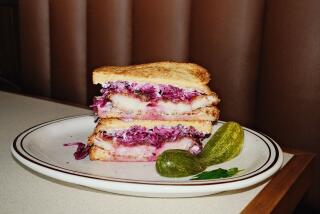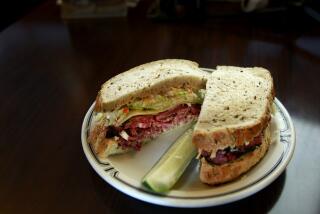Underwriting Dispute : Caught in Bear Market, Hershel’s Won’t Go Public
- Share via
Suffering the effects of a suddenly bearish stock market, Hershel’s Deli & Bakery Inc. will not be going public after all--its planned initial offering the victim of a disagreement between Hershel’s and its lead underwriter over the company’s market value.
Whether the company will pursue a public stock offering is still “under consideration,” said Ed Benson, vice president and chief financial officer for Hershel’s.
The sale, which was announced last summer, fell through in mid-September after the Riverside-based company rejected a proposal to cut the offering price to around $10 a unit from $12.50 a unit, said Bill Spinks, executive vice president of Grey Randolph & Abbott Ltd., the Missouri investment firm that was to handle the sale.
Grey Randolph suggested the price cut because it believed that the steep drops in the Dow Jones industrial average during early September would make it harder to sell the units, which consisted of two shares of stock and one warrant to purchase an additional share of stock, Spinks said.
“As the managing underwriter, we wanted to lower the offering price from $12.50 to the $10 range,” he said. “We felt that was justified, but the board of directors at Hershel’s didn’t want to go with a lower price.”
Hershel’s was started in 1983 by maverick restaurateur Harold Butler, who also founded the Denny’s, Naugles and the Jojos restaurant chains. Butler, who has vowed that Hershel’s--Yiddish for Harold’s--will be his last effort in the restaurant business, opened the first of the eight delis while he was still chairman of Orange-based Naugles.
Last year, Butler sold his Naugles stock to Collins Foods International of Los Angeles for a reported $7 million and acquired additional funding from Collins’ chairman to help finance the Hershel’s chain. Initial offerings in general--and those of restaurant stocks in particular--have fared poorly in recent months, said Sarah Stack, an analyst with the Los Angeles investment firm of Bateman Eichler, Hill Richards Inc.
“The underwriter was probably correct in assessing where the market is and that the market could not bear $12.50,” said Stack, who added that restaurant chains which have yet to achieve profitability are even harder to sell. “I think $10 might be a bit high,” Stack said.
During the fiscal year that ended June 26, Hershel’s expected to lose nearly $2 million on revenues of about $13 million, according to documents filed earlier this year with the Securities and Exchange Commission. The company has not yet filed an annual report.
The bulk of the $8 million to $9.4 million in proceeds from the offering were earmarked for a planned expansion of the Hershel’s chain to 17 units from the present eight. Company officials had said they wanted to open a total of 20 of the New York-style delis by 1988.
Still Seeks New Capital
Although the expansion plans will be “reevaluated,” Hershel’s continues to seek new capital by other means, including private stock sales, said Ed Benson, vice president and chief financial officer.
Benson blamed the cancellation of the stock offering on recent market weakness, but also blamed the failure on Grey Randolph’s request to “change the structure of the deal in a manner the board was not willing to go along with.”
The changes, he said, would have affected the $2 million in proceeds that were to be used to repay debts owed to James A. Collins, chairman of Collins Foods International. According to SEC filings, Hershel’s owes Collins $3.9 million.
Hershel’s occupies a unique niche in the deli restaurant business. The restaurants are open 24 hours a day, feature extensive menus which include everything from knishes to kugel and boast full-service bakeries to boot.
While the notion of a national delicatessen chain is “appealing,” analyst Stack argues that it is a tough business. “The menus are so large in deli-type operations that it’s difficult to make money.”
More to Read
Inside the business of entertainment
The Wide Shot brings you news, analysis and insights on everything from streaming wars to production — and what it all means for the future.
You may occasionally receive promotional content from the Los Angeles Times.










